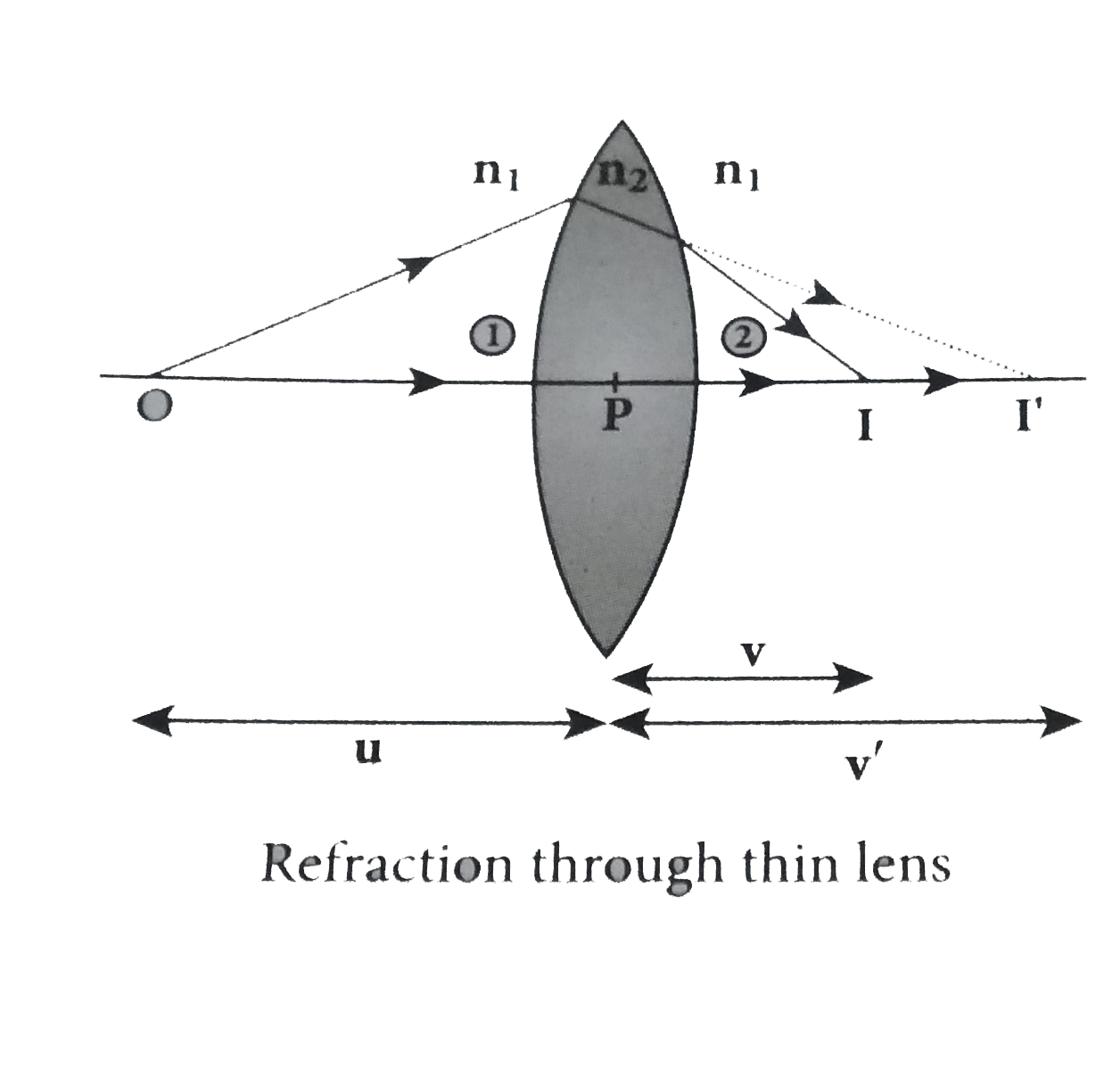Obtain lens maker's formula and medium its signification. Lens maker's formula and lens equation: Solution in Tamil
Let us consider a thin lens made up of a medium of refractive index n2. is placed in a medium of refractive index n1. Let R1 and R2 be the radii of curvature of two spherical surfaces (1) and (2) respectively and P be the pole. Consider a point object O on the principal axis. The ray which falls very close to P, after refraction at the surface (1) forms image at I.. Before it does so, it is again refracted by the surface (2). Therefore the final image is formed at I. The general equation for the refraction at a spherical surface is given by
n2v−n1u=(n2−n1)R
For the refracting surface (1), the light goes from n1, ton2,
n2v’−n1u=(n2−n1)R1
For the refracting surface (2), the light goes from medium n2, ton1,
n2v’−n2u=(n1−n2)R2
Adding the above two equations (1) and (2)
n1v−n2v’=(n2−n1)(1R1−1R2)
Further simplifying and rearranging,
1v−1u=(n2−n1n1)(1R1−1R2)
1v−1u=(n2n1−1)(1R1−1R2)
If the object is at infinity, the image is formed at the focus of the lens. Thus, for u = ∞,, y = f. Then the equation becomes.
1f−1∞=(n2n1−1)(1R1−1R2)
1f=(n2n1−1)(1R1−1R2)
If the refractive index of the lens is n, and it is placed in air, then n = n and n = 1. So the equation (4) becomes,
1f=(n−1)(1R1−1R2)
The above equation is called the lens maker.s formula, because it tells the lens manufactures . what curvature is needed to make a lens of desired focal length with a material of particular refractive index. This formula holds good also for a concave lens. By comparing the equations (3) and (4) we can write,
1v−1u=1fThis equation is known as lens equation which relates the object distance u and image distance v with the focal length of the lens. This formula holds good for a any type of lens.

Topper's Solved these Questions
- BOOK - FULL MARKSCHAPTER - SAMPLE PAPER-05 ( SOLVED ) EXERCISE - PART-III9videos
SAMPLE PAPER-05 ( SOLVED )
- BOOK - FULL MARKSCHAPTER - SAMPLE PAPER 9EXERCISE - PART-IV10videos
SAMPLE PAPER 9
- BOOK - FULL MARKSCHAPTER - SAMPLE PAPER-07 (SOLVED )EXERCISE - (PART - IV)(Answer all the questions.)10videos
SAMPLE PAPER-07 (SOLVED )
Similar Questions
Give the relation between electric field and electric potential .
13:41View SolutionHow do we determine the electric field due to a continuous charge distribution ? Explain. Electric field due to continous charge distribution
07:14View SolutionCalculate the electric field due to a dipole on its equatorial plane. (OR) Electric field due to an electric dipole at a point on the equatorial plane
View SolutionArrives at lens equation from lens maker's formula .
07:16View SolutionObtain lens maker's formula and medium its signification. Lens maker's formula and lens equation:
07:16View SolutionWrite the lens maker's formula.
07:16View SolutionDerive th lens maker's formula.
05:04View SolutionDerive th lens maker's formula.
13:41View SolutionDerive th lens maker's formula.
07:14View SolutionLens maker's formula is applicable to
07:14View SolutionArrives at lens equation from lens maker's formula .
03:01View SolutionObtain lens maker's formula and medium its signification. Lens maker's formula and lens equation:
View SolutionObtain lens maker's formula and medium its signification. Lens maker's formula and lens equation:
View SolutionLens formula is
07:36View SolutionDerive lens maker's formula for a thin biconvex lens.
02:15View Solution

